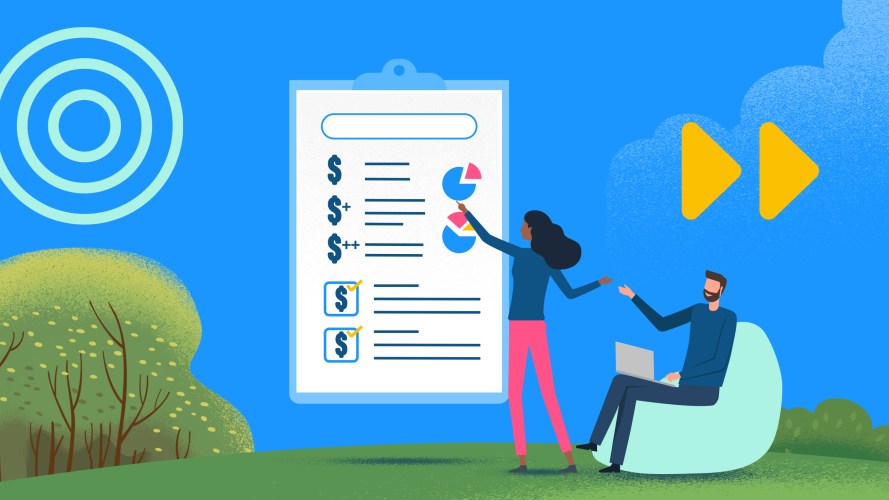If you’ve struggled to create sales comp plans for your sales engineers, you’re not alone. Comp planning for any role poses challenges – and for versatile, complex roles like sales engineers, the process can become even trickier than usual.
In this guide, we’ll share with you our best tips and advice on how to create sales engineer compensation plans that will motivate your team and increase productivity across your entire organization.
Motivate your team with transparent incentive pay
Discover the power of automating commissions with Salesforce Spiff, and easily create incentive programs that scale.



Why is compensating sales engineers difficult?
Before we jump into the tactical execution, let’s first look at why designing comp plans for sales engineers is a more complicated process than it is for other sales roles.
Sales engineers have multifaceted roles
The best sales engineers are technically-minded like an engineer, forward-thinking like a product manager, and have the selling chops of an AE. Being a sales engineer means you likely have a diverse and fluid set of responsibilities – giving technical presentations, consulting with customers and prospects, providing technical support, and so on. As a result, it can be difficult to determine exactly what behaviors, outcomes and metrics to tie to a sales engineer’s compensation.
Sales engineers often fly under the radar
Sometimes, an account executive may get most of the credit for a deal, even when a sales engineer puts in more work towards an opportunity. That’s because an AE is entirely judged off of their wins and losses, whereas a sales engineer contributes in ways that aren’t necessarily reflected in their win rate. When it’s difficult to quantify how much a sales engineer impacts results, it’s difficult to compensate them fairly.
There’s no uniform growth trajectory for a sales engineer
People often become sales engineers because they’re drawn to the changing nature of the role. No two days look the same. But what happens when a sales engineer decides they’re looking to grow or move upward in an organization? They often struggle to make lateral moves because they are good at so many things – but because they aren’t specialized in one unique area, making a move often includes a pay cut. This can make motivating and incentivizing sales engineers difficult because there is no prescribed growth path.
How to motivate sales engineers to perform
Now let’s talk about what sales engineers care about and how to give them a workload and compensation program that motivates them.
1. Focus on what your sales engineer can control
It’s easy to get caught up in win/loss ratios and revenue tied to a specific sales engineer. Both of these metrics are important, but it becomes tricky when it comes to motivating a sales engineer, because the sales engineer doesn’t always have direct control over those outcomes.
These sales commission metrics should be part of the conversation, but it’s more important to focus on aspects of the job like time management, relationships, SLAs, and other factors that sales engineers can control. If you focus on factors within your sales engineer’s control, you’ll see an increase in their ability to contribute to some of those broader KPIs that aren’t fully in their control.
2. Mix up your sales engineer’s workload
Sales engineers come from many different backgrounds, but in many cases, they share a desire for a frequent change of scenery. Come up with side projects, unique tasks, team roles, etc. that allow your sales engineers to flex many of their different muscles.
There is a reason your sales engineer isn’t a product engineer, AE, or CSM – so listen to each individual’s unique wants and interests, and help them embrace what they love most about the role. Every salesperson should have some say in their workload and compensation – but this is particularly true for a multilayered role like a sales engineer.
3. Offer a sales culture of learning and development
Building off our last point, don’t box your sales engineers into one designated set of responsibilities and one unchangeable compensation plan. Give them opportunities to shadow different departments, go through continuous sales training, and pursue the career trajectory that satisfies them the most.
4 tips for creating sales engineer compensation plans
Now that you understand more about motivating sales engineers, let’s talk through a few different ways you can influence that motivation through sales compensation. Even though sales engineers love the engineering part of their title, they wouldn’t be here if it wasn’t for the “sales” aspect of their role. Sales engineers like money too – so how do you compensate for this role correctly?
1. Create a compensation plan for sales engineers that is simple and visible
This is a pretty universal concept, but keep your commission structure simple enough that your sales engineers understand what they are earning, why, and how they can earn more.
Because of the uniqueness of their role, their compensation often gets very complicated and tied into many different parts of the business. Avoid this problem by clearly defining the activities they should be performing, the outcomes they should be working towards, and how they’ll be compensated for each one.
2. Create a compensation plan for sales engineers with a higher base and lower variable
Determining the right pay mix is a vital step of any sales compensation plan. For AEs and other roles directly involved in closing deals, a commission-heavy pay mix makes sense. You want to offer these roles a lower base salary and more variable pay because it’ll motivate them to bring in as much revenue as possible.
Sales engineers are different. They can play many different roles in helping a deal close and helping customer experience improve, and some of the impact of these roles is unavoidably hard to quantify. So, it makes sense to give them a compensation structure that tilts heavily towards base salary – somewhere between a 60/40 and 80/20 split of base/variable pay.
That way, sales engineers still have an incentive to perform the actions that earn them some extra variable pay – but their higher base salary motivates them to help prospects and customers in ways that can’t always be quantified and compensated for.
3. Tie the majority of sales engineering KPIs to company or team achievements
A sales engineer’s success is partially dependent on the other salespeople they work with during a deal cycle. If you want to promote a healthy sales culture, make sure your sales engineer’s compensation isn’t directly tied to just one individual or a small group of people.
Here’s what we mean. A sales engineer could be a rockstar, but if the small group of AEs they support all have a down period – perhaps they go on vacation or struggle for some reason – then the sales engineer gets penalized. Mitigate this problem by rewarding sales engineers for overall sales org performance, so that when the company is doing well collectively, all sales engineers benefit. From there, you can also reward each sales engineer for the close rates they participate in so that their individual contribution isn’t ignored.
4. Leverage management-based objectives (MBOs) as part of your compensation plan
MBOs are a great way to give your sales engineers more control over their variable compensation. If you’re unfamiliar, MBOs are clearly defined individual goals that are agreed upon by employees and leadership, with the purpose of motivating individuals to contribute to broader company goals.
For sales engineers, MBOs may be related to their time management, the e-learning courses they enroll in, the number of special projects they contribute to, and the training they complete that is targeted to help them improve specific sales skills.
These MBOs might make up something like 20 or 30 percent of a sales engineer’s variable compensation, but incentivizing such activities helps keep sales engineers accountable even when some of their contributions don’t necessarily show a one-to-one impact on revenue and closed deals.
Strategically compensate sales engineers to help the entire sales org deliver better results
Your sales engineering team can make a massive impact on your overall success if managed and motivated correctly. More than ever, people buy from people, and no one is better at explaining the technical advantages of your product than a good sales engineer. Recognize what makes your sales engineers unique and reward them correctly for their contributions, and the entire sales org will benefit.
Launch sophisticated compensation plans fast
Is outdated commissions management hurting your growth? See how to quickly create automated incentive plans that motivate your reps.































